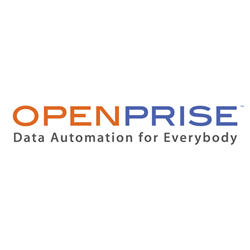Ed King, CEO and Founder at Openprise comments on how the development of RevOps and RevTech platforms will help sales and marketing teams realign their processes and strategies for better outcomes:
_____
Welcome to this martech chat Ed, tell us more about Openprise and your journey as a tech founder so far…
Thank you! At Openprise, we often say, “its garbage-in/garbage-out.”
Let me tell you a bit about how we came up with that motto. Before starting Openprise, I ran marketing and product management at several different companies, and I was often responsible for tools like Marketo and Salesforce. And at every company, I saw the same issues.
There was always a lot of data, but not enough usable data. We had point solutions to cleanse and enrich data. But nothing ever worked together. And more importantly, we didn’t have processes in place to make sure that data was continuously cleansed, deduped, enriched, and segmented. Without building a foundation of data we could trust, downstream processes like routing, scoring, and attribution never worked very well. So we started Openprise to build the platform I wished I’d had throughout my career—to automate any process, simplify complex tech stacks, and make data useful.
Today, the Openprise RevOps Performance Platform, delivers a single, no-code platform enabling RevOps teams to automate any process, transform any data, and simplify even the most complex RevTech stack.
Marketing Technology News: MarTech Interview with Clay Walton-House, Managing Director of Integrated Customer Loyalty Solutions…
How are you seeing data orchestration (technologies and practices) change in today’s marketplace? What are some predictions that you have for the future of this space?
Since Openprise coined the term data orchestration in 2017, we’ve seen analysts and other vendors adopt the terminology. So that tells me that we’ve identified a true need—as well as an acceptance—in the market for what we’re doing.
The great thing about data orchestration, and the main reason this model makes more sense than point solutions, is that because it’s built as a platform, everything is just a process. As a result of this investment in platform infrastructure, it’s really easy to add capabilities. For example, we added Attribution capabilities in 2019 and Customer Data Platform functionality in 2020. We’ve been able to do that because we built the platform first. These features are processes we built into our platform that integrate seamlessly with all the other processes we’ve already built—like segmentation, routing, and scoring. And we’ll continue to add capabilities faster than companies that are trying to build point solutions to solve specific problems.
We’re seeing that companies are starting to realize that buying one of everything is not a good strategy, and we’re talking to a lot of companies that are engaging in stack rationalization. In the recent past, data orchestration was a concept adopted by the really forward-thinking RevOps pioneers. But we’re now starting to see more mainstream adoption as RevOps teams realize that complex stacks (a) not only don’t work very well, but actually lead to more manual tasks, and (b) aren’t stable, don’t scale, and keep them in perpetual firefighting mode.
What are some of the top lags and challenges that you’ve seen marketing and sales teams struggle with (still) despite their access to tools to enrich and cleanse data? What are some top best practices you have to share?
One of the biggest challenges I see from marketing and sales teams is thinking that data quality problems are about data, when, in fact, they are about process. Bad data is a symptom, and building processes helps you fix the root cause.
This actually leads right to the second challenge, which is jumping into technology purchases without taking a macro view of your business requirements, data, people and processes. At Openprise, we’ve found that to solve any business problem you need to think about it in this order: people > process > data > technology methodology. Really understanding your people, process, and data, will help you determine which technology will work best for your needs. The technology should serve the people, enable the process, and make the data usable. Don’t let the lure of cool technology distract your decision making or you’ll eventually pay the price for this mistake.
Another challenge is ensuring that you have a firm data foundation. By that I mean that you build trust in your data by focusing on three strategies: improving data quality, removing data silos, and automating systems. Everything starts with clean data. So you have to get it clean and keep it clean. The best way to do that is with a data orchestration solution that automates cleansing and standardization. From there, data orchestration can automate more complex processes that require pristine data like routing, scoring, and attribution, as well as the unification of sales, marketing, billing, and any other systems, so you can easily get the full funnel metrics you need.
Finally, we’re still seeing RevOps teams struggle with getting users secure access to the data they require. Data orchestration can eliminate this issue by enabling a self-service model to fulfill data requests—democratizing the process of delivering data tailored specifically to those users’ business requirements, freeing up RevOps teams to focus on more strategic initiatives.
With RevOps / RevTech coming to the limelight, how do you feel surrounding technologies / marketing technologies will evolve further to meet and align to this new norm and trend?
At Openprise we’ve focused on elevating RevOps teams from having to be the gatekeepers of data and trying to manage complex tech stacks using disconnected or manual tools into a strategic organization that plays an important role in generating revenue for their companies.
Going forward, RevOps and RevTech will continue to evolve and realign teams around specific GTM initiatives, including ABM. And as businesses continue to ramp back up in 2021, there will be an increasing focus on agility and speed driven in large part by RevOps organizations. Marketing technologies will need to support RevOps agility initiatives by delivering no-code solutions that streamline bloated tech stacks, automate manual processes, unify disparate data platforms, and provide timely intelligence to marketing and sales stakeholders.
Tell us about some of the future innovations planned for Openprise that users can look forward to?
We’ve got a lot in store…what I can currently share with you is that we’ll continue to expand integrations with leading CRM and MAP platforms and productivity applications. For example, we recently launched an integration with Hubspot. We’re continuing to expand the Openprise Data Marketplace with new data providers; we’ve recently added European providers like Bureau van Dijk and SMB specialists like Data Axle.
And we’re expanding capabilities around self-service data delivery and interactivity that RevOps can provide for users in the broader marketing and sales organization—where they can easily access and edit the data they need, but they can edit and write back to the database. This capability offers a novel approach over reporting and BI solutions and it’s the only solution that allows users to write back to the database and initiate and interact with business processes via purpose built interactive apps. This is in contrast to other solutions that offer lots of reporting, but nowhere where you can actually write back to the database.
A few predictions that you have for the future of martech and data practices in marketing and sales?
As the market has matured from 1.0 to 2.0 stack architecture, we’ll continue to see RevOps focus on stack consolidation and streamline operational processes. RevOps can no longer afford bloated stacks of single-use point solutions where nothing works together. Instead, they’ll keep the solutions that work across multiple departments and get rid of the one-trick ponies. The shiny objects, aka single point solutions, will have lost their luster.
As more RevOps teams adopt data orchestration to automate the right processes, more teams will have the capability to manage untrustworthy data and gain better insights into relevant data.
Going forward, we’ll see a trend for more data access and interactivity. This will mean instant data access and interactivity for data consumers vs. submitting a ticket and waiting.
We’ll also see a convergence of sales, marketing, and CS platforms, as well as data unification by data orchestration solutions to eliminate silos, deliver more meaningful, relevant insights and automation from this new data. In a nutshell, marketers will be able to figure out which data is relevant, mash up all of the data silos, and derive value from it.
A few takeaways for marketing leaders and CMOs/CEOs in 2021: top factors they should keep in mind as they plan for the rest of the year, innovate and expand their teams?
First and foremost, is the importance of scaling and having the business processes in place to do that. This isn’t the sexy stuff; everyone wants to talk about things like the shiny new ABM product, or a new video app that lets salespeople personalize their engagements. At the end of the day, those are tactics, not strategies, and they won’t deliver long term results.
At Openprise, we look for scalable processes in our organization and in all of our technologies, and advise our customers to do the same. You’ve got to look for scalable processes in everything you do.
Marketing Technology News:Blockgraph Appoints Media and Advertising Veteran Scott Collins as EVP of Client Partnerships and…
What’s NEW on the SalesStar Podcast?
 The Openprise RevOps Performance Platform improves company performance by orchestrating data, processes, and interactions to improve the performance of every go-to-market initiative. Openprise is a single, no-code platform that can help to simplify even the most complex RevTech stack.
The Openprise RevOps Performance Platform improves company performance by orchestrating data, processes, and interactions to improve the performance of every go-to-market initiative. Openprise is a single, no-code platform that can help to simplify even the most complex RevTech stack.
Ed King is the founder and CEO of Openprise. He’s been building stuff as far as he can remember. Prior to founding Openprise, Ed was VP of Marketing and Product Management at companies including Axway, Vordel, Qualys, Agiliance, and Oracle. He deployed Marketo three times before doing it again at Openprise. Each time he was handicapped by poor data quality but no more!












Comments are closed.